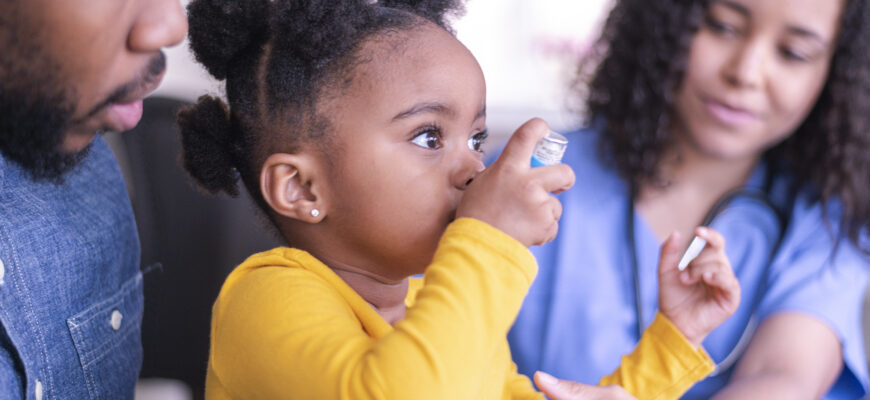
Asthma is the most common chronic disease of childhood, affecting more than one million of our kids around the world. Severe symptoms can change throughout childhood and into adulthood. Asthma symptoms in kids may also be very different from those in adults. There can be times when it can go into remission or even resolve completely. Knowing the common symptoms of asthma in kids and how they can change over time can help you and your child get the right medical care as soon as possible.
Most kids with asthma develop symptoms before the age of 5. The bronchial tubes (the airways that allow air to go in and out of the lungs) are very small and narrow in kids. Colds and illnesses can inflame these airways, causing confusion about whether the resulting symptoms are asthma or not.
The main symptoms of asthma in early childhood may include:
- Cough (can be dry or wet/produces mucus)
- Wheezing
- Shortness of breath
- Trouble breathing or fast breathing
- Frequent colds that settle in the chest
- Whistling sound when breathing out
- To determine whether the symptoms are a result of asthma, your child’s doctor will do a medical exam. They will also perform a test that measures airflow in and out of the lungs. This is known as a spirometry test.
As kids get older, asthma symptoms change from distinct episodes of wheezing caused by viral infections to more instances of symptoms triggered by an allergic reaction. Exercise-induced reactions are also more noticeable in this age group. This may be due to changes in the condition over time. In some cases, kids in late childhood will rarely have everyday asthma symptoms but will have severe reactions to triggers like cold weather, cigarette smoke, or seasonal allergies. Asthma attacks triggered by viral infections are less likely in this age group than in younger children.
Although asthma is typically thought of as a childhood disease, nearly half of adults with asthma develop the condition during adulthood. It is a common adult condition, and more doctors are considering the term “asthma” to include a variety of symptoms.
Common asthma symptoms in adults include shortness of breath, wheezing, chest tightness and cough.
If you notice symptoms in your child that could be signs of asthma, talk with your child’s doctor. They can do an exam and perform tests to make sure your child gets the right diagnosis and treatment. It might help to keep a symptom log with the symptoms your child experiences, possible triggers or what your child was doing when symptoms appeared, and what helped to improve the symptoms.
If your child has been diagnosed with asthma and prescribed asthma medications, talk to your pharmacist today about best practices for managing asthma symptoms.


